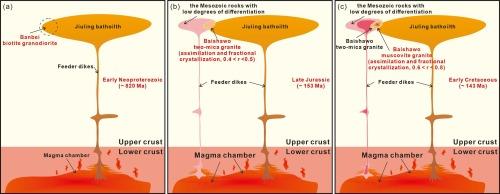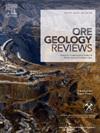The formation and recycling of Neoproterozoic granitoids in the Jiangnan Orogen, South China: Implications for Mesozoic rare metal mineralization
IF 3.2
2区 地球科学
Q1 GEOLOGY
引用次数: 0
Abstract
In the era of energy transition on the Earth, rare metal mineralization has attained increased significance for various energy sectors and understanding their formation and evolution in various tectonic settings is of great importance for formulating exploration strategies. The Neoproterozoic Jiangnan Orogen in South China marks the assembly zone of the Yangtze and Cathaysia blocks and carries numerous rare metal deposits. In this contribution, we investigate the Neoproterozoic Jiuling composite batholith to understand the formation of rare metal mineralization. We present new in-situ zircon U–Pb ages and Lu–Hf isotopes, and whole-rock geochemistry and Sm–Nd isotopes of the Banbei biotite granodiorite and the associated rare metal-mineralized Baishawo granites in the western portion of the Jiuling batholith suite. Zircon U–Pb dating indicates that the Banbei biotite granodiorite, and the Baishawo two-mica granite and muscovite granite formed at ca. 820 Ma, 153 Ma, and 142 Ma, respectively. The εHf(t) values of the biotite granodiorite, two-mica granite and muscovite granite are –4.4 to +5.8, –11.8 to –7.0, and –10.5 to –7.3, respectively. The εNd(t) values of the biotite granodiorite, two-mica granite and muscovite granite are –3.88 to –2.73, –10.6 to –10.2, and –9.23 to –9.16, respectively. Zircon Hf isotopes and whole-rock Sm–Nd isotopes suggest that the granite suite was sourced from the Mesoproterozoic crust. Geochemical modeling suggests that the Banbei biotite granodiorite was derived from partial melting of Meso- to Neoproterozoic metasedimentary rocks, whereas the Baishawo two-mica granite and muscovite granite were derived from assimilation–fractional crystallization of the Neoproterozoic Banbei biotite granodiorite and Mesozoic magma with low degrees of differentiation. Combined with previous studies on the granite suites in the Jiangnan Orogen, we suggest that collision between the Yangtze and Cathaysia blocks ceased at least 820 Ma, and that Precambrian rocks might have contributed significantly to the enrichment of rare metal mineralization in Mesozoic granite through reworking.

华南江南造山带新新生代花岗岩的形成与循环:对中生代稀有金属成矿的影响
在地球能源转型时代,稀有金属成矿对各能源领域的重要性日益凸显,了解其在不同构造环境中的形成和演化对制定勘探战略具有重要意义。华南新近新生代江南造山带是长江块体和华夏块体的集合带,蕴藏着大量稀有金属矿床。在本文中,我们研究了新近新生代九岭复合岩床,以了解稀有金属矿化的形成。我们介绍了九岭组合浴岩体西部的板北黑云母花岗岩和伴生稀有金属矿化的白沙窝花岗岩的新的原位锆石U-Pb年龄和Lu-Hf同位素,以及全岩地球化学和Sm-Nd同位素。锆石U-Pb年代测定表明,板北黑云母花岗岩、白沙窝双云母花岗岩和蕈云母花岗岩分别形成于约820Ma、153Ma和153Ma。分别形成于约 820 Ma、153 Ma 和 142 Ma。黑云母花岗闪长岩、二云母花岗岩和蕈云母花岗岩的εHf(t)值分别为-4.4~+5.8、-11.8~-7.0和-10.5~-7.3。而生物花岗闪长岩、二云母花岗岩和蕈云母花岗岩的εNd(t)值分别为-3.88至-2.73、-10.6至-10.2和-9.23至-9.16。锆石 Hf 同位素和全岩 Sm-Nd 同位素表明,该花岗岩套件来自中新生代地壳。地球化学模型表明,坂北黑云母花岗岩是由中新生代至新新生代元成岩部分熔融而成,而白沙窝双云母花岗岩和蕈云母花岗岩则是由新新生代坂北黑云母花岗岩和中生代岩浆同化-分化结晶而成,分化程度较低。结合以往对江南造山带花岗岩组的研究,我们认为,长江块体与华夏块体的碰撞至少在820Ma时就已停止,前寒武纪岩石可能通过再加工对中生代花岗岩中稀有金属矿化的富集起到了重要作用。
本文章由计算机程序翻译,如有差异,请以英文原文为准。
求助全文
约1分钟内获得全文
求助全文
来源期刊

Ore Geology Reviews
地学-地质学
CiteScore
6.50
自引率
27.30%
发文量
546
审稿时长
22.9 weeks
期刊介绍:
Ore Geology Reviews aims to familiarize all earth scientists with recent advances in a number of interconnected disciplines related to the study of, and search for, ore deposits. The reviews range from brief to longer contributions, but the journal preferentially publishes manuscripts that fill the niche between the commonly shorter journal articles and the comprehensive book coverages, and thus has a special appeal to many authors and readers.
 求助内容:
求助内容: 应助结果提醒方式:
应助结果提醒方式:


